Energy
The efficient generation, storage and distribution of energy are important problems to be solved for a sustainable future. We work on new technologies to improve the efficiency of climate control for buildings and power generation from wind energy. We also work on methods utilizing distributed and flexible loads to improve the control and robustness of electrical grids.
Power System Control
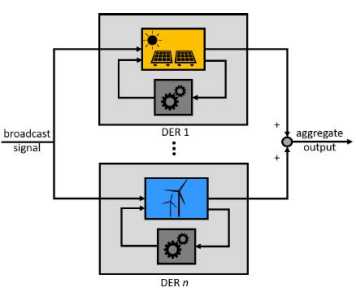
Increasing penetration of renewable generation such as wind and solar in the power grid is creating new challenges for power system stability and control. As renewable generation is interfaced to the grid via power converters, traditional control paradigms employed by fossil fuel-red generation will have to be replaced by novel power converter control techniques. Our work aims to reimagine power converter control to ensure stability of future power systems, with a particular focus on (1) ensemble control of distributed energy resources to act collectively as a single dynamic virtual power plant, (2) data-enabled predictive control of power converters, (3) grid forming converter control for low-inertia power systems, and (4) control for hybrid DC/AC grids. More
Buildings and Energy
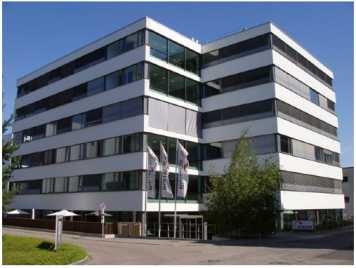
Building and district heating and cooling energy amounts to 70% of the total energy demand in households in Switzerland and to more than 44% of the total primary energy consumption worldwide. Efficient control methods can help to significantly reduce this consumption. In our theoretical research, we investigate in the areas of robust and stochastic MPC and system identification. In our applied research, we combine methods from control theory and machine learning to optimally control room temperatures with data-driven controllers, provide electrical reserves with heat pumps and optimally coordinate electrolyzers with H2 storage. More
Airborne wind energy
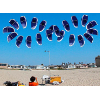
Airborne Wind Energy (AWE) Systems harvest wind energy by exploiting the aerodynamic forces generated by autonomous tethered wings, flying fast in crosswind conditions. This technology is able to reach higher altitudes, compared to conventional wind turbines, where the wind is generally stronger and more consistent. To achieve fully-autonomous, power-optimising flight of tethered wings, this projects focuses on advanced modelling and identification methods for unstable systems. This finally enables the design of optimal controllers for tracking periodic orbits in varying operating conditions. More
Electrical power grid control
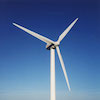
The accommodation of uncertain forecasts is one of the most pressing challenges in the control of power systems with a high penetration of intermittent renewables, such as wind and solar power. Our recent work has demonstrated the use of robust optimization with multi-stage recourse policies to provide reserves much less conservatively than with existing means. Our approach is particularly attractive for ensuring that devices such as plug-in electric vehicles, pumped hydro plants, batteries, and building HVAC can participate in reserve provision while still making guarantees on future availability of stored energy. More
Demand response methods
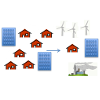
Through controlling the flexibility of demand side resources, we address grid security in the presence of renewable sources of energy. Population control, stochastic optimal control, and game theoretic methods are being developed for control of an aggregation of a large number of distributed loads, such as household appliances or electric vehicles, and an aggregation of a small number of office buildings. More
Buildings and Energy
Building and district heating and cooling energy amounts to 70% of the total energy demand in households in Switzerland and to more than 44% of the total primary energy consumption worldwide. Efficient control methods can help to significantly reduce this consumption. In our theoretical research, we investigate in the areas of robust and stochastic MPC and system identification. In our applied research, we combine methods from control theory and machine learning to optimally control room temperatures with data-driven controllers, provide electrical reserves with heat pumps and optimally coordinate electrolyzers with H2 storage. More